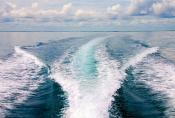The Challenges of Unpredictable Marine Energy

05.01.2024

Unpredictable Marine Energy From Military to Superyacht
From military to superyacht, it is clear there is an urgent need to consistently measure current fuel use and compare alternative forms of energy.
Battery-electric, hybrid, hydrogen, methanol, ammonia, bio fuels and eFuels are all being considered. But one of the main challenges is having standard methods so that end users, boat builders and technology providers have a common language.
Search and Intercept are UnpredictableWhen a search & rescue vessel puts to sea in a storm there are multiple variables of energy demands. Speed to casualty saves lives. But how much energy is needed to push through breaking seas? How long will the search last for? Will the casualty vessel need to be towed? As one rescue ends will another begin?
For military or government vessels 'patrol' appears to be a regular duty. But once a target is identified the task could last for hours or even days. Whether it is a chase or an intercept key questions are: Where will the mission end for re-fueling? Will alternative fuels or energy be available there?
Ferries are Easy to Predict
From carrying out feasibility studies for multiple types of vessels we know it is far easier to consider alternative energy for any type of ferry. Repeatable tasks with a timetable - for example wind farm support vessels moving technicians daily for maintenance duties on the towers - fall into this 'ferry' type role.
A container ship leaving Asia heading for Europe has a defined outcome of both distance to cover in sea miles plus a date and time it is expected on a berth in Rotterdam. A 'cruising speed' for ships has predictable energy demands, now mapped by energy indexes. Many smaller vessels are completely the opposite.
NEXT GEN Energy ANALYSIS Workshop
It is essential to establish which analysis methods are viable - plus how real-world duty cycles and use cases fit with different forms of energy data.
NEXT GEN Energy ANALYSIS workshop, run via Teams in October 2023, focused on exactly this for sub 24m and 25m to 100m vessels. Topics were especially relevant for those operations that have unpredictable duty cycles. The theme was 'Using Metrics to Benchmark Current Fuels Versus Alternative Energy.'
WHY MEASURE and What Energy Data is Relevant?
Workshop Lead John Haynes opened with experience of: Operating profiles and use cases to benchmark energy for single vessels and fleets.
UK MoD, Border Force and RNLI discussed: The challenges and opportunities of using data as part of decarbonisation planning.
Mike Bassett, Engineering Director of MAHLE Powertrain examined: How lessons from automotive and transport can be relevant for marine.
Panel Discussion with Q&A included: How do we compare diesel and petrol use with alternative energy - battery - hydrogen? Setting up a vessel - powertrain - use case register for feasibility studies.
MEASURING TECHNOLOGIES and Methods
Karl Birgir Björnsson, CEO & Co-Founder of HEFRING Marine looked at: Real time vessel performance monitoring and control solutions for safety and energy.
Kai Reichelt, Marine Engineer & BD Manager Testing of RINA delved into: The challenges of unpredictable versus predictable duty cycles.
The session included: Decision making tools for vessel operating efficiency and engineering condition. The aim is using data to reduce fuel consumption and emissions.
USING DATA to Shape Decisions and Case Studies
Giulio Gennaro - Project Engineer & Hybrid Architect at VULKAN shared: Analyzing operating data to design hybrid systems for optimum efficiency.
Engineering & Technical Designers are developing tools for: Improving vessel efficiency through modelling, simulation and digital twins.
Bram Jongepier, Senior Design Specialist at De Voogt Naval Architects reflected on: Developing YETI - the Yacht Environmental Transparency Index is relevant to all.
Experience of Real World Operations & Energy: Ranged from Superyachts to the 24/7 demands of the Offshore and Renewables industry - from hybrid to hydrogen.
Panel Discussion with Q&A included: Energy for propulsion versus onboard energy requirements. What is really working NOW and what is coming NEXT?
Focus on Practical Solutions that deliver Real Gains
With safety always front and centre, NEXT GEN highlights effective solutions for sub 24m vessels and 25m to 100m vessels. Including ferries, workboats, patrol craft, military platforms, superyachts and unmanned craft.
Workshops run as Dynamic Meetings NOT Webinars
International attendees include commercial, government and military organisations, boat builders, technology OEMs, engineers, naval architects and class societies.
What Can Be Specified Now - By 2025 - By 2030
The unique knowledge gained from NEXT GEN helps to shape real world decisions - from improvements to in-service powertrains to procurement of next generation vessels.
More About NEXT GEN Marine ENERGY >
All images are copyright RIB & HSC 2024 unless otherwise stated.
This does not exclude the owner's assertion of copyright over the material.

09.07.2024
NEXT GEN Marine BATTERY Workshop via Teams
NEXT GEN Marine BATTERY Workshop is being held via…
05.01.2024
The Challenges of Unpredictable Marine Energy
From military to superyacht, it is clear there is an urgent…
Southampton International Boat Show 2024
Dates:
13 to 22 September 2024
Location:
Southampton UK
Foiling and Flying RIBs
Foiling powerboat designed to meet military needs - fast, stable, silent, fuel-saving. Collaboration by SEAir Foiling Systems and Sillinger RIBs.…













